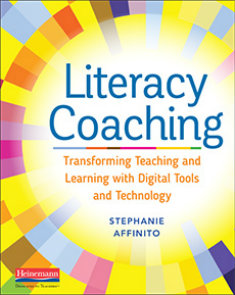Selecting Digital Tools for Literacy Coaching
Literacy Coaching: Transforming Teaching and Learning with Digital Tools and Technology
By Stephanie Affinito
(Heinemann, 2018 – Learn more)

Though there are many books focused on effective literacy coaching and others specific to technology integration in education, Stephanie Affinito’s Literacy Coaching: Transforming Teaching and Learning with Digital Tools and Technology fills a gap by merging the two goals.
This text helps literacy coaches navigate the vast world of technological tools to identify those that can be most supportive of their practice. It serves as a metamodel of an impactful coaching relationship — in the same way that coaches partner with teachers, Affinito partners with readers.
Vignettes of her own experiences in schools, as well as examples from practicing teachers and coaches, keep the book relatable and grounded in the realities of the profession.
Using tech to support learning

Consequently, much of the book focuses on effective coaching practices, such as building relationships and listening intently, rather than emphasizing technology for its own sake. For readers new to coaching, this is invaluable information, and for experienced coaches, these practices are worth revisiting often.
Embedded differentiation (which will be discussed later in this review), makes this text appropriate for professionals at varying points in their coaching careers.
Each chapter explores technology within a common coaching role: learning community facilitator, professional development provider, and classroom collaborator. The final chapter encourages coaches to embark on their technological journeys in mindful ways, purposefully seeking inspiration and practicing professional self-care.
Beyond the printed page
Affinito skillfully integrates multimodality in the book, which is reflective of the ever-broadening field of literacy as a whole. Full-color visuals, an invitation to sketch, screenshots, and interactive QR codes allow readers to engage beyond the standard print on the pages and connect with a wider audience through a broad range of texts, graphics, videos, and more.
Affinito encourages readers to share responses on social media through hashtags, linking participants to others engaged with the book. She also includes information about online book studies and professional learning communities that teachers can use to deepen their professional knowledge.
In this way, she models how coaches build community by creating a text-centered network of collaborative readers. The dialogic, highly participatory nature of the book makes it a true reflection of 21st century skills and new literacies.
Scaffolding technology for diverse coaches
For those most comfortable with more traditional approaches, Affinito differentiates the content. Throughout the book, the “Be a Techspert” boxes outline digital resources that may be helpful to coaches and are color-coded for ease of use. Some examples of beginning tools introduced are Padlet and Goodreads, and some intermediate ones include Voxer and Educreations. This feature serves as a helpful scaffold by making it easy to transition from less complex to more sophisticated applications, and it ensures that specific information can be accessed quickly when referring back to the text.
Additionally, Affinito gradually introduces readers to technological supports, being careful not to overwhelm them by delving into virtual resources too quickly. She does this by first conveying the need for both traditional and modern approaches in education, quelling readers’ potential fears of digital applications completely displacing conventional methods. Once readers feel safe in this assurance, she gradually opens the door to technological possibilities without discounting their more traditional predecessors.
On page 12, she writes, “Just because technology is changing the way we work, learn, and play does not mean that the traditional coaching tools we rely on are obsolete.” This is immediately followed by a chart on page 13 listing traditional tools and their technological counterparts, one example being printed books and digital books. This theme continues throughout the book all the way through the appendices, which are available in both digital and print formats.
Step-by-step directions
As readers are introduced to technological possibilities, they are offered “launching points” that provide step-by-step directions on how to begin with tools that may seem initially daunting, such as Thinglink. These highly comprehensible prompts make digital options feel approachable by easing readers in to the process of becoming acquainted with unfamiliar possibilities. Affinito also includes “If-Then-With” charts that guide readers in choosing tools to help them accomplish specific goals.
The interactive nature of this book ensures that the audience is actively constructing meaning rather than passively receiving information. The opportunities to virtually connect with others are numerous and fully optional; each reader is able to experience the text as they see fit, in accordance with individual comfort levels.
A valuable resource despite tech’s limited lifespan
In terms of audience, there are two limitations. While this text outlines tools that can be highly beneficial in distance-coaching scenarios, it is primarily geared towards school-based literacy coaches. Consequently, some of the information is not applicable to virtual coaching. It also does not directly address working with coaching-resistant teachers, though many of the tools could certainly be used to build relationships and establish teacher-coach partnerships.
Affinito explicitly states that tools in the book may become outdated quickly due to the rapidly changing nature of technology. This inevitability has already come to fruition less than one year after publication as Google Plus, one platform that readers are encouraged to explore, is being ushered out.
As time goes on, more applications mentioned in this book will certainly meet the same fate. Perhaps a continually updated ebook or mini-website could provide readers with information about the most current tools. However, Affinito’s message of using technology to bolster pedagogy and developing the adaptive mindset to make the most of it is timeless.
After graduating from the University of North Carolina at Chapel Hill with a bachelor’s degree in education, Shannon Russell began teaching. She later earned a master’s degree in reading from North Carolina State University and became an intervention teacher and instructional coach. She is currently pursuing a doctorate in literacy and English language arts education while working as a distance-based literacy coach with the Wolfpack WORKS program, serving high-need schools in North Carolina.






























